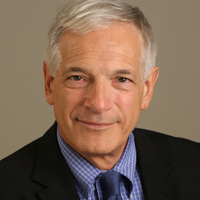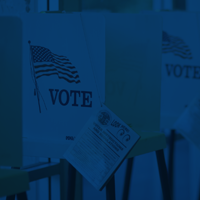The commentary below by MacArthur President Robert Gallucci was originally published in The Chronicle of Philanthropy.
America’s democracy is in trouble.
Given the current government shutdown, the rancor of our political process, the likelihood that we will go on lurching from crisis to crisis, and the low level of confidence Americans have in their government, that observation probably won’t stir much controversy.
But it ought to be a call to action. As citizens, we should be deeply concerned that our political system is failing. As donors, we should be equally engaged. Philanthropic foundations pride themselves on taking on urgent and significant challenges. They don’t come more urgent or significant than the future of our republic.
The malaise of representative democracy in this country is not only a betrayal of American ideals and principles. It has real and negative effects on our economy, the health of our institutions, and our standing in the world.
Why should we in philanthropy get involved? Because it is in our interest.
To do our best work, philanthropy needs both a healthy public sphere and sound public policy. We seek solutions to complex issues like climate change, criminal justice, health, and human rights. For all of them, effective public policy is critical. A range of options needs to be widely aired and analyzed. Then credible proposals must be translated into sound public policy that will further the common good.
Yet at present, our public debate is shrilly partisan, grounded too often in ideology rather than evidence. Professional lobbyists and big donors wield disproportionate influence fighting for their narrow interests rather than the public interest. Our legislators appear unable to hold meaningful negotiations or to broker agreements. Indeed “compromise” has become a dirty word to many elected officials. This is no way to make sound policy or to run a democracy.
There are direct consequences for philanthropy. When the policy environment is dysfunctional, our grant making loses value—we get less for our money. The problems we care about are large in scale and cannot be fully addressed without supportive public policy.
I am convinced both that our nation can do better and that there are meaningful ways in which philanthropy can make a contribution. A healthy democracy is a complex ecosystem.
Ideally, it comprises an engaged and informed citizenry, free and fair elections, responsible media that hold elected officials accountable, and trustworthy political leaders who serve the people. There are problems that donors can address in each of the parts of that simplified formulation to strengthen democratic norms and practices.
I speak from our own experience. Two years ago, MacArthur made strengthening America’s democracy a goal of our work and our grant making. Still in an exploratory period, our work benefits from the insights of other grant makers and from research and discussion with a wide range of experts and advocates.
Many issues compete for our attention. There are many ways to engage and educate voters, especially young voters. The system of primaries and the gerrymandering of districts appear to be pushing candidates away from the political center, but alternatives could be adopted. Disparate voting processes across the country undermine the fundamental fairness of our elections. Barriers to voting discourage an already under-participating electorate. Our voting system cries out for modernization to make it accountable and trustworthy. The right to vote, a fundamental pillar of democracy, must be protected.
Most troubling is the influence of money in politics. Lobbyists disclosed $3.3-billion in spending in 2011, so it is not surprising that their work is influential in policy debates.
The Federal Election Commission estimates a record $7-billion was spent on the 2012 election by candidates, political parties, and outside political committees.
The average Senate seat cost $10.5-million and House seats $1.7-million. The need to raise this kind of money transforms legislators into fundraisers. Worse still, it makes the interests of the largest donors more important than those of other constituents and can produce what Lawrence Lessig, a Harvard law professor, calls “dependence corruption.”
MacArthur has selected a few of the possible areas that need philanthropic support. So far, we have made grants to promote voter access, ballot integrity, and accountability in campaign finance. We were already supporting work to advance civics education and participation by young people, high-quality investigative journalism, and greater civility and bipartisan collaboration in Congress. We have also begun to look at ways in which growing economic inequality in our country influences the democratic system.
We were glad to join the dozen or so foundations already active in the field. Together we support organizations that inform and engage voters, provide expertise to those who administer the voting system, monitor campaign-contribution and lobbying-disclosure data, protect the right to vote, devise new ways to pay for campaigns and defend public financing programs already in place, and enhance public understanding of the potential conflicts facing elected judges who must raise campaign funds.
Foundations, which often provide a lead for the nonprofit world, should be doing more. We should begin by strengthening the organizations that are already active, coordinating our efforts to have a greater collective impact, and speaking out clearly in defense of democratic values and norms. Beyond that, we can choose from an array of possibilities, such as voter education or research into the consequences of interest-driven public policy.
We also call on our colleagues, both in foundations and at other nonprofit organizations, to look closely at how money in the political system is limiting progress in their important work on the environment, housing, education, and justice, to name just a few. We invite them to join with those of us already thinking about strengthening democracy to help us seek and support practical and creative measures to raise public awareness of the relationship between money and specific public policies and to find alternative ways to finance campaigns.
This is a fundamental issue for all of us.
The media can support this effort by examining systematically and consistently the role of lobbyists and campaign donations in influencing the participants in our political debates. And the media can spotlight nonpartisan organizations that are making a difference.
Of course, the challenges are enormous. We are trying to reverse trends that have developed over decades, root out entrenched ways of doing business, and make deep changes in American culture. It will be a hard slog and a slow process.
Our goal should be a political system that is credible, transparent, and responsive to the needs of ordinary people. I do not believe this is an issue that belongs to either the left or the right. It is a defense of government “of the people, by the people, for the people” against corruption, special interests, and corporate wealth.
Some ideas are inherently powerful enough to inspire people and change the course of events. Stronger democracy and better government seem powerful to me. It’s time for philanthropy to get behind them.




